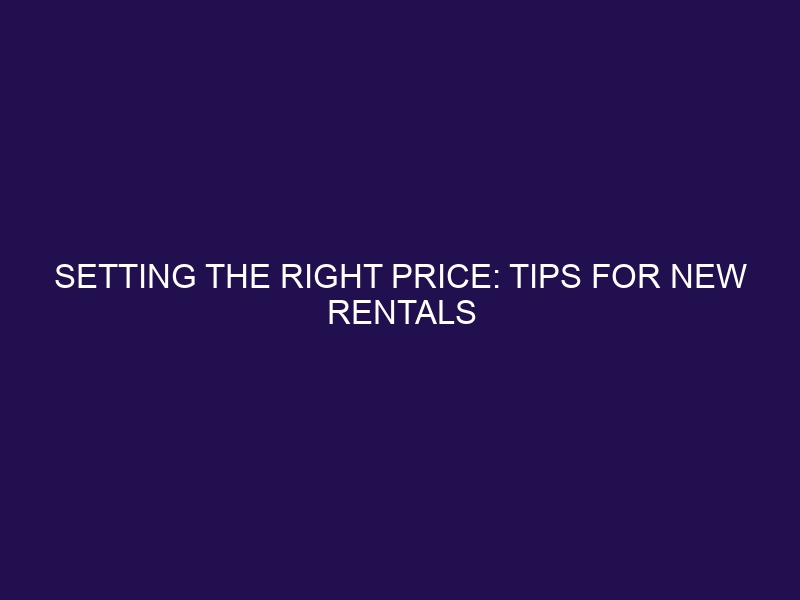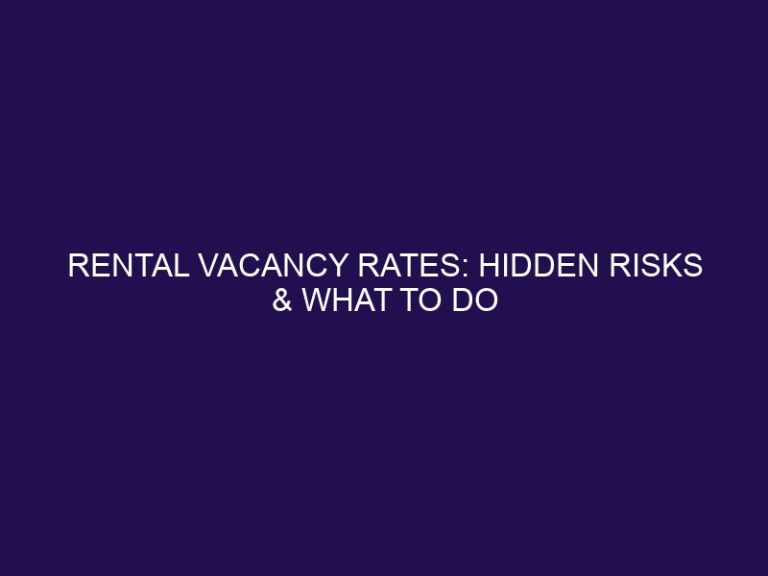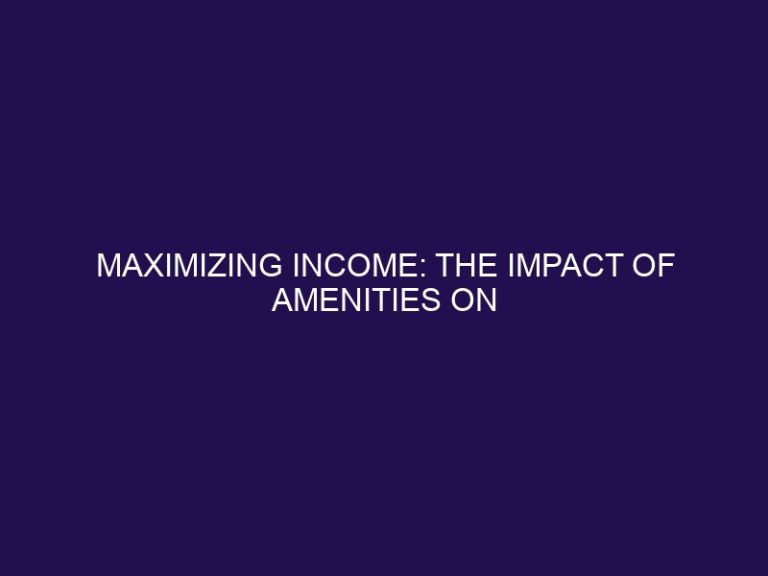Setting the Right Price: Tips for New Rentals
A rental property is a real estate property that is leased out to a tenant for a specified amount of time, typically for residential purposes. Setting the right price for a rental property is crucial for attracting potential tenants and maximizing profits. As a new landlord, it can be challenging to determine the right price for your rental property. Here are some tips to help you in the process.
There are several factors that affect rental prices, including location, property type, amenities and features, and market demand. The location of your rental property plays a significant role in determining its price. Properties in desirable locations such as urban areas or near public transportation tend to have higher rental prices. The type of property, such as a single-family home or apartment, also influences the rental price. Other factors like the size and condition of the property also play a role.
To determine the right price for your rental, conduct thorough research on comparable properties in your area. This will give you an idea of the market rates and help in setting a competitive price. It’s also important to consider your expenses, including mortgage payments, insurance, property taxes, and maintenance costs, when determining the rental price. Setting a competitive price will attract potential tenants while also ensuring you make a profit.
There are some common mistakes to avoid when setting rental prices. Overpricing can lead to longer vacancy periods, while underpricing can result in lost profits. It’s crucial to consider market trends and adjust your prices accordingly. Regularly monitoring the market and making necessary adjustments can help you stay competitive and attract potential tenants.
If you want to adjust your rental prices over time, there are a few things you can do. Regularly monitoring market trends and making necessary adjustments is important. Also, consider making upgrades to your property to justify an increase in rent. It’s also essential to maintain communication with your tenants and discuss any changes in rental prices with them. This will help them understand and prepare for any adjustments.
What is a Rental Property?
A rental property is a type of real estate asset that is leased or rented to tenants in exchange for a specified amount of rent. This can include residential, commercial, or industrial properties, and serves as a source of passive income for the owner.
When considering investing in rental properties, factors such as location, amenities, and market demand should be taken into account.
What Factors Affect Rental Prices?
When it comes to setting the right price for your rental property, there are several important factors to consider. These factors can greatly influence the rental price and ultimately determine the success of your rental business. In this section, we will discuss the key elements that can affect rental prices, including location, property type, amenities and features, and market demand. By understanding these factors, you can make informed decisions when determining a fair and competitive rental price for your property.
1. Location
- Evaluate the location’s proximity to amenities and facilities.
- Assess the neighborhood’s safety and community appeal.
- Consider the accessibility to public transportation and major highways.
- Research the history of property value appreciation in the area.
Pro-tip: Prioritize locations with a track record of steady property value growth.
2. Property Type
- Single-Family Homes: Ideal for small families or individuals seeking privacy.
- Multi-Family Buildings: Suited for landlords aiming to manage multiple units under one property and a great option for those looking for a specific property type.
- Condominiums: Great for urban living with shared amenities and minimal maintenance, making it a popular choice among certain tenant demographics.
Pro-tip: When considering a property, it’s important to take into account its specific type and how it may appeal to your target tenant demographic.
3. Amenities and Features
Amenities and features, such as a pool, gym, or in-unit laundry, have a significant impact on rental prices. Properties that offer 3. amenities and features can demand higher rents, attracting tenants who value convenience and luxury. Moreover, unique features such as smart home technology or energy-efficient appliances can further increase the rental value.
4. Market Demand
Market demand plays a significant role in determining rental prices. In areas with high demand, such as city centers, rental rates tend to be higher. On the other hand, areas with lower demand may require more competitive pricing.
Having a thorough understanding of market demand is essential for setting profitable rental rates and attracting potential tenants.
How to Determine the Right Price for Your Rental?
As a new rental property owner, one of the most crucial decisions you will make is determining the right price for your rental. This can be a challenging task, but fear not, as we will guide you through the process. In this section, we will cover the essential steps you need to take to ensure you are setting the right price for your rental. From researching comparable properties to considering your expenses and ultimately setting a competitive price, we have got you covered. Let’s dive in!
1. Research Comparable Properties
- Conduct thorough research on similar rental properties in your area, taking into consideration their size, amenities, and location.
- Analyze their rental prices to accurately gauge the market rates.
- Consider any factors that set your property apart and adjust the price accordingly.
When researching comparable properties, be sure to take into account both similarities and differences in order to set a competitive yet profitable rental price.
2. Consider Your Expenses
- Evaluate fixed expenses such as mortgage, insurance, and property taxes.
- Consider variable expenses like maintenance, repairs, and vacancies.
- Include one-time costs such as renovations and marketing.
When determining rental prices, it’s crucial to comprehensively assess all expenses, including the 2. Consider Your Expenses, to ensure profitability and competitiveness in the market.
3. Set a Competitive Price
- Research comparable properties in the area.
- Analyze your expenses for setting a reasonable price.
- Set a competitive price based on similar rentals in the neighborhood.
Pro-tip: Offering incentives like flexible lease terms can attract quality tenants and help you set a competitive price.
What Are Common Mistakes to Avoid When Setting Rental Prices?
One of the most crucial decisions for a new rental property owner is setting the right price. Unfortunately, many make the mistake of either overpricing or underpricing their rental units, which can lead to financial loss or difficulty finding tenants. In this section, we will discuss the common mistakes to avoid when setting rental prices. We will examine the consequences of overpricing and underpricing, as well as the importance of considering market trends in determining the optimal rental price for your property.
1. Overpricing
- Evaluate local rental market prices to avoid setting the rental price too high.
- Consider property features and amenities in comparison to other rentals.
- Seek feedback from potential tenants regarding their perception of the rental price.
Setting the right rental price is crucial for attracting tenants and maximizing income. Overpricing can deter potential renters, leading to longer vacancies and financial loss.
2. Underpricing
- Assess the market: Analyze similar rentals in the area to avoid underpricing.
- Consider amenities: Factor in unique features of your property to justify pricing.
- Consult experts: Seek guidance from real estate professionals for accurate pricing strategies.
3. Not Considering Market Trends
- Regularly analyze market trends in rental prices.
- Compare your rental rates with similar properties in the area.
- Adjust prices based on demand and supply dynamics.
Not considering market trends can greatly impact the competitiveness of your rental prices and the satisfaction of your tenants.
How to Adjust Rental Prices Over Time?
As a landlord, setting the right price for your rental property is crucial for attracting tenants and ensuring a steady income. But what happens when the market changes or your property undergoes upgrades? In this section, we will discuss how to adjust rental prices over time. By regularly monitoring market trends, considering property upgrades, and communicating with tenants, you can ensure that your rental prices are in line with the current market and provide a fair value for both you and your tenants.
1. Regularly Monitor Market Trends
- Consistently keep track of market trends to remain informed on any changes in rental rates and demand.
2. Consider Property Upgrades
- Evaluate necessary repairs or improvements based on tenant feedback and market demands.
- Upgrade key areas like kitchens, bathrooms, and energy-efficient features to enhance property value.
- Consider Property Upgrades such as fresh paint, modern fixtures, and landscaping for curb appeal to increase rental income by up to 20%.
Did you know? Property upgrades can increase rental income by up to 20%.
3. Communicate with Tenants
- Regularly communicate with tenants to understand their needs and concerns, building a positive landlord-tenant relationship.
- Hold periodic meetings or surveys to gather feedback on property amenities and potential improvements.
- Provide clear channels for tenants to raise issues and ensure prompt resolution.
Pro-tip: Fostering a positive landlord-tenant relationship leads to long-term tenant satisfaction and retention.
Frequently Asked Questions
What factors should I consider when setting a rental price for my property?
When determining the appropriate rental price for your property, it is important to consider a variety of factors. These include the local market conditions, economic factors, desired amenities and features, and the target tenant profile. Additionally, you should also take into account any necessary cash flow for your personal financial goals, as well as the operating expenses and past listings in the area.
How can I attract good tenants and maximize my profits?
Setting the right rental price is essential for attracting good tenants and maximizing profits. By finding the “sweet spot” for fair market rent, you can appeal to ideal tenants while also covering ongoing costs and achieving your financial goals. Additionally, offering desirable amenities and keeping up with maintenance can help attract and retain quality renters.
What are some tips for setting the initial rent estimate for my property?
To determine the initial rent estimate for your property, research the local market and compare your property to similar ones in the area. You can do this through online tools or by consulting a property management company. Consider factors such as the number of bedrooms and bathrooms, as well as any upgrades or amenities. It is also important to keep in mind any rental rules and regulations in your area.
How can I ensure that my rental price is competitive and in line with market rent?
To ensure that your rental price is competitive and in line with market rent, it is important to regularly review and compare your property to others in the area. Look at factors such as the current price and rental demand. By staying on top of market conditions and adjusting your pricing strategy as needed, you can maximize your rental income and minimize vacancy periods.
Should I consider the “2% rule” when setting my rental price?
The “2% rule” states that your monthly rent amount should be at least 2% of the property’s purchase price. While this can be a helpful guideline, it is not always accurate, especially in areas with high property values. It is important to also consider other factors such as operating expenses and market conditions when setting your rental price.
Why should I consult a property management company when setting my rental price?
A property management company can provide valuable insight and guidance when setting your rental price. They have a comprehensive array of tools and resources to help determine the ideal rent rate for your property. Additionally, they are knowledgeable about local laws and regulations, ensuring that your rental price is in compliance and maximizing your bottom line.







